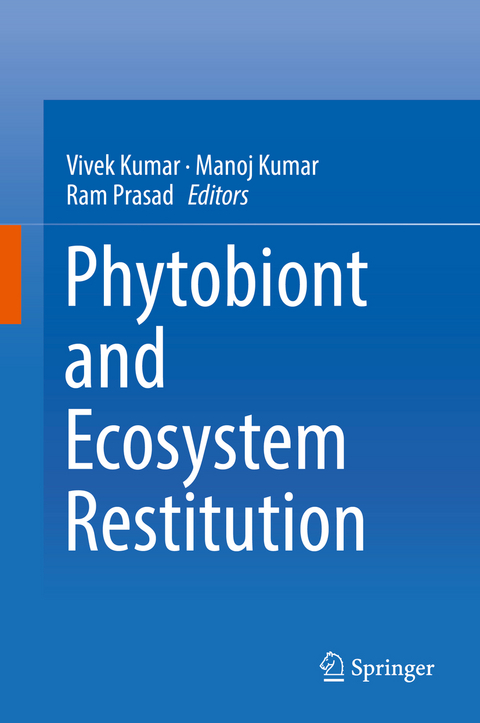
Phytobiont and Ecosystem Restitution
Springer Verlag, Singapore
978-981-13-1186-4 (ISBN)
With detailed diagrams and illustrations, the book is a valuable resource for experts and novices in the field of microbial bioremediation, phyto-bioremediation and environmental microbiology
Dr. Vivek Kumar is an Associate Professor working at the Himalayan School of Biosciences, Swami Rama Himalayan University, Jolly Grant, Dehradun, India. He currently serves on the editorial boards of various respected international journals, including Environment Asia, International Journal of Biological & Chemical Sciences, Environmental Sustainability, Journal of Advanced Botany and Zoology, and Journal of Ecobiotechnology. He is also a reviewer for prestigious international journals such as the Journal of Hazardous Materials, Environmental Sustainability, Science International, Acta Physiologiae Plantarum, Environment Science & Pollution Research, and Rhizosphere. He has authored more than 100 publications, including research papers, review articles, book chapters, and also edited several Springer books. Dr. Kumar has served as a microbiologist at the Department of Soil and Water Research, Public Authority of Agricultural Affairs & Fish Resources, Kuwait for eight years. He has been credited with first reporting and identification of Pink Rot inflorescence disease of date palms in Kuwait caused by Serratia marcescens. He was awarded the 2002 ‘Young Scientist Award’ in Agricultural Microbiology by the Association of Microbiologists of India (AMI). Dr. Kumar's research areas include plant-microbe interactions, environmental microbiology and bioremediation. He has also organized various outreach activities. Dr. Manoj Kumar is an Associate Professor, Centre for Life Sciences, Central University of Jharkhand, Ranchi, India. He is committed to high-quality science that contributes to both increasing intellectual knowledge of plant development and increasing the ecological niche. Dr. has pursued his PhD in Plant Biotechnology at the prestigious Jawaharlal Nehru University and was then awarded two postdoctoral fellowships: i) DBT-PDF from IISc Bangalore in 2005 and then NRF-PDF from the Universities of Pretoria and Melbourne. He is leading a diverse research group in Life Sciences supported by DBT-BUILDER program, Ministry of Sciences and Technology, Govt of India. He referees for several journals, including Phytoremediation, and the Journal of Soil Sediments. Dr. Kumar’s research focuses on the integration of microbial genetics with a range of plant physiological approaches to enable novel gene discovery and conferring of metabolites. Dr. Ram Prasad is associated with Amity Institute of Microbial Technology, Amity University, Uttar Pradesh, India. His research interests include plant-microbe interactions, sustainable agriculture and microbial nanobiotechnology. Dr. Prasad has written more than hundred publications, including research papers, review articles & book chapters. He has five patents issued or pending, and edited or authored several books. Dr. Prasad has twelve years of teaching experience and was awarded the Young Scientist Award (2007) & Prof. J.S. Datta Munshi Gold Medal (2009) by the International Society for Ecological Communications; FSAB fellowship (2010) by the Society for Applied Biotechnology; the American Cancer Society UICC International Fellowship for Beginning Investigators, USA (2014); Outstanding Scientist Award (2015) in the field of Microbiology by Venus International Foundation; BRICPL Science Investigator Award (ICAABT-2017) and Research Excellence Award (2018). Dr. Prasad served as Visiting Assistant Professor, Whiting School of Engineering, Department of Mechanical Engineering at Johns Hopkins University, USA and is currently a Research Associate Professor at the School of Environmental Sciences and Engineering, Sun Yat-Sen University, Guangzhou, China.
Role of Plants and Microbes in Bioremediation of Petroleum Hydrocarbons Contaminated Soils.- Nanobiotechnology Approaches for Crop Protection.- Roles of Plants and Bacteria in Bioremediation of Petroleum in Contaminated Soils.- Recent Advances in Microbial Remediation of Textile Azo Dyes.- Application of Plant-Microbe Interactions in Contaminated Agro-ecosystem Management.- Phytoremediation for the Elimination of Metals, Pesticides, PAHs, and other Pollutants from Wastewater and Soil.- Bioremediation of Heavy Metals and Hydrocarbon Polluted Environments.- Bioremediation of Contaminants.- Modeling Applications in Environmental Bioremediation Studies.- Study on Clinopathological and Biochemical Changes in Some Freshwater Fishes Infected With External Parasites and Subjected to Heavy Metals Pollution in Egypt.- Bioremediation of Azo Dyes.- Development of Field Platforms for Bioremediation of Heavy Metal Contaminated Site.- Seasonal Variations and Prevalence of Some External Parasites Affecting Freshwater Fishes Reared at Upper Egypt.- Biocontrol Agents as Strategy of Agro-ecosystem Management to Restitution of Productive Soils for Food Production.- Heavy metals, polycyclic aromatic hydrocarbons (PAHs), radioactive materials, Xenobiotic, Pesticides, Hazardous chemicals and dyes bioremediation.- Rhizospheric Microbe-Plant Exudate Formulation for Enhanced Restoration of Contaminated Agricultural Soil.- Rhizoremediation of Azodyes by Constructed Wetland Technology using Typha latifolia.- Some Investigations observed in Culture Seabass (Dicentrarchus labrax L.) infested with Lernanthropus kroyeri and Nerocila orbignyi and Exposed to Cadmium Pollution during different seasons at Dammaitte province.- Bioremediation of Polyaromatic Hydrocarbons: Current Status and Recent Advances.- Microbial Assisted Phytoremediation for Heavy Metal Contaminated Soils.- Implementation of Trichoderma spp. for Conservation of Soil Health.- Water Quality Assessment and Treatment of PharmaceuticalIndustry Waste Water: A Case Study of Pharmacity Selaqui, Dehradun of Uttarakhand State, India.- Phytobionts of Wastewater and Restitution.- Role of Fungi in Dye Removal.- Does Mycoremediation Reduces the Soil Toxicant?.- The Importance of Plant-Microbes Interaction for the Bioremediation of Dyes and Heavy Metals.- Bioremediation of Textile dyes: Appraisal of conventional and Biological Approaches.- Plant-Microbe Association to Improve Phytoremediation of Heavy Metal
| Erscheinungsdatum | 28.12.2018 |
|---|---|
| Zusatzinfo | 30 Illustrations, color; 43 Illustrations, black and white; X, 487 p. 73 illus., 30 illus. in color. |
| Verlagsort | Singapore |
| Sprache | englisch |
| Maße | 155 x 235 mm |
| Themenwelt | Medizin / Pharmazie ► Physiotherapie / Ergotherapie ► Orthopädie |
| Naturwissenschaften ► Biologie ► Genetik / Molekularbiologie | |
| Naturwissenschaften ► Biologie ► Mikrobiologie / Immunologie | |
| Technik ► Medizintechnik | |
| Technik ► Umwelttechnik / Biotechnologie | |
| ISBN-10 | 981-13-1186-2 / 9811311862 |
| ISBN-13 | 978-981-13-1186-4 / 9789811311864 |
| Zustand | Neuware |
| Haben Sie eine Frage zum Produkt? |
aus dem Bereich


